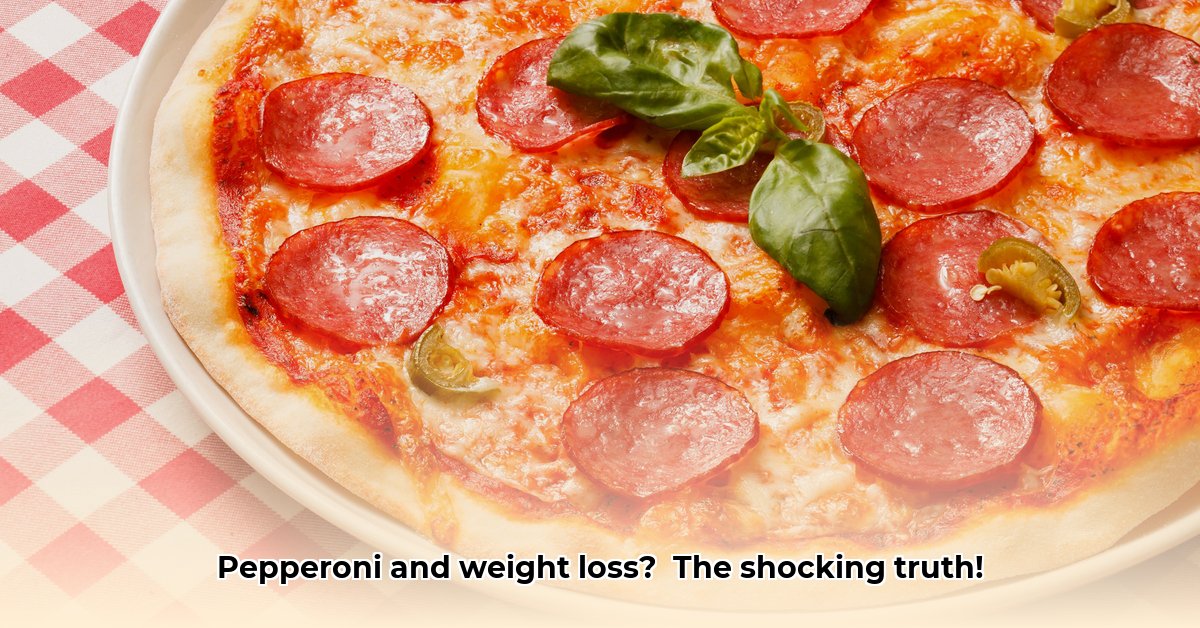
The Pepperoni Paradox: A Delicious Deception?
Let's be honest: the idea of pepperoni aiding weight loss feels like a delicious fantasy, not a realistic goal. While undeniably tasty, pepperoni is a processed meat packed with calories, fat, and sodium—not your weight-loss allies. This article will delve into the nutritional details to determine if pepperoni has any place in a weight-loss diet.
Calories: A Sneaky Slice of the Problem
One ounce of pepperoni (a few slices) contains a surprisingly high number of calories, undermining your calorie deficit—essential for weight loss. A significant portion of these calories comes from fat. Isn't it interesting how such a small amount can significantly impact your daily intake? How many slices do you think you could eat before exceeding your daily calorie goal?
Fat: The Good, the Bad, and the Very Bad
Pepperoni's high fat content is a major concern, with a substantial portion being saturated fat. Saturated fat raises cholesterol levels, impacting heart health and hindering weight-loss efforts. While not all fats are detrimental, pepperoni's fat profile is largely unfavorable. Remember, healthy fats from sources like avocados and nuts offer benefits. But pepperoni? Not so much.
Sodium: More Than Just Bloating
The excessive sodium in pepperoni contributes to water retention, leading to bloating and a misleading increase in weight. While not actual weight gain, this temporary fluctuation can be disheartening. How much sodium is too much sodium? Checking food labels is crucial for making informed choices.
Protein: A Small Player in a Big Problem
While pepperoni contains some protein, the quantity is insignificant compared to its high calorie and fat content. Leaner sources like chicken breast, fish, or lentils provide far more protein with fewer drawbacks, effectively supporting your weight loss without the added baggage of unhealthy fats and excessive sodium. Wouldn't you rather get your protein from a healthier source?
The Occasional Indulgence: A Calculated Risk?
Can you occasionally enjoy a small slice of pepperoni while losing weight? Perhaps. But for significant weight loss, it shouldn't be a dietary staple. It's simply too calorie- and fat-dense. Think of it as a rare treat, not a regular part of your meal plan. Let's be practical here: is the momentary satisfaction worth potentially hindering your progress?
Smarter Choices: Swapping for Success
Instead of pepperoni, choose healthier, protein-rich alternatives. Options like lean grilled chicken or turkey breast, lentil soup, or bean salad offer ample protein without the negative consequences. Experiment with different spices and cooking methods to keep meals interesting and flavorful! Think outside the pizza box!
Long-Term Weight Management: A Holistic Approach
Sustainable weight loss involves healthy habits. This means embracing a diverse diet rich in nourishing foods and incorporating regular physical activity. While a rare slice of pepperoni won't derail your entire effort, it won't contribute meaningfully to your goals either. Focus on the overall balance of your diet and lifestyle for long-term success.
Choosing Healthier Deli Meats: Navigating the Sodium and Preservative Minefield
Let's face it: processed deli meats, frequently featuring high sodium and preservatives, pose challenges for weight management and overall health. Understanding how to navigate these options is key to making smart choices.
Decoding Deli Meat Labels: A Step-by-Step Guide
- Ingredients List: Scrutinize the list; simpler ingredient profiles generally indicate healthier options.
- Sodium Content: Compare sodium levels across brands and types; aim for less than 200mg per serving.
- "Uncured": This signifies the use of natural preservatives (nitrates from sources like celery juice).
- Fat Content: Opt for leaner cuts like turkey breast or chicken breast over higher-fat choices.
- Portion Control: Even healthier deli meats should be consumed moderately.
Healthier Alternatives: Expanding Your Options
Explore leaner cuts of turkey or chicken, minimally processed deli meats, or vegetarian/plant-based alternatives.
Key Takeaways:
- High sodium and preservatives in many deli meats negatively impact weight and health.
- Choosing leaner cuts, paying attention to sodium content, and opting for "uncured" options (when possible) are strategies for healthier deli meat selection.
- Even healthier deli meats should be consumed in moderation as part of a balanced diet.
- Read food labels carefully and explore diverse protein sources to reduce reliance on processed meats.